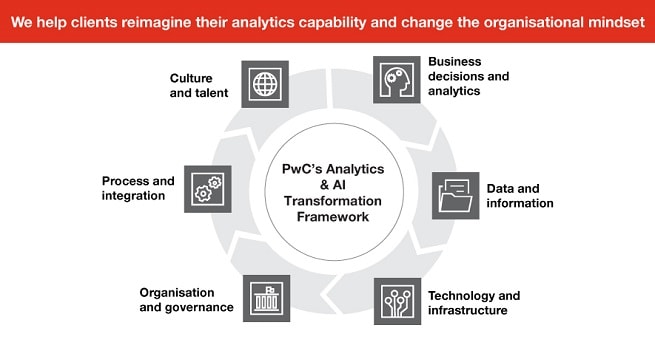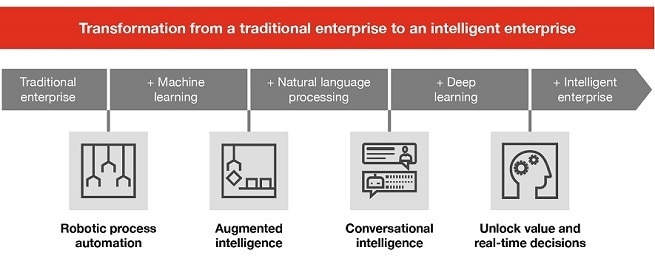At PwC's Data and Analytics Centre of Excellence, we help customers build new solutions and digital assets to keep them ahead of the curve. The Centre promotes a culture of data-driven problem-solving and innovation and facilitates the adoption of new tools and technologies by clients. It also allows clients to experience prototypes that can be built quickly using reusable tools, accelerators and reference models available at our Centre, requiring minimum investment on their part.
The Centre is driven by competent D&A professionals equipped with knowledge of emerging tools and technologies to support customer engagements. It also serves as a training platform for our people, enabling them to generate tangible value while working on client engagements right from pursuit to execution.
What we do
- D&A Strategy
- Data Marts and EDW Implementation
- Data Analytics on ERP
- Data Lake Strategy and Implementation
- Data Management and Governance
- Enterprise Performance Management
- AI-enabled Advanced Analytics
- PwC Insights as a Service (PIAS 2.0)
- Analytics CoE Strategy and Implementation
D&A Strategy
In the era of analytical transformation and automation, businesses have an inevitable need to change the traditional way of looking into data and deriving insights. We have proven expertise and capabilities to help organisations transform analytically, by helping them calibrate their data and analytics (D&A) strategy through assessing analytical maturity, mapping requirements, aligning change management and creating the roadmap. We work with businesses to setup an analytics infrastructure using our proprietary models, enable cloud, establish analytics CoE and governance frameworks to transform all aspects of people, processes & technology and align analytics efforts with the organisation's strategic vision and mission.
Data Marts and EDW Implementation
With data being considered as the new ‘oil’, organisations rely heavily on building capabilities to generate, process and manage data by integrating disparate systems and applications. This requires implementing Enterprise Data Warehouse (EDW) solutions using the best-in-class technologies in line with the organisations vision and growth strategy. Our strong Data & Analytics practice, with rich industry experience, has helped numerous organisations build a new age data strategy to implement robust EDW solutions. These help generate insights needed for supporting decisions, timely regulatory reporting, establish single version of truth and develop industry specific data marts that help businesses find opportunities to optimise costs and grow.
Data Analytics on ERP
Analytics on ERP provides actual intelligent data that can be used to drive business decisions and strategy, not just numbers. An ERP acts as a gigantic repository of learned information and operational data. Analytical solutions on ERP not only collect and present data in real-time, but can also combine information with pre-existing analytics to provide a more accurate picture of a company’s efficiency, productivity, maintenance requirements, and even financial health. By applying past data to real-time analytics, it can create forward-looking models to help decision makers identify new opportunities to meet deadlines, improve efficiency, and surpass business goals.
Data Lake Strategy and Implementation
We help businesses get a single source of truth, combining disparate systems and incorporating both structured and unstructured data into the data lake. Clients are empowered with high performance, state-of-the art architecture that enables them to incorporate advanced analytics use cases and cross functional system aggregation in a scalable and cost effective manner.
Data Management and Governance
Organisations often pursue data governance as a compliance and regulatory need. Over the years, with the explosion of data being generated from internal and external systems and processes, ‘data governance’ as a function has evolved. It has now become imperative for organisations to invest in data governance, in order to drive their ‘control’ and ‘growth’ agendas. Our expertise revolves around building processes for ‘data quality’ measurement and monitoring, defining the need for metadata management and business glossary for achieving a single version of truth, data security, privacy and policies for data lifecycle management. We help define the organisation’s governance operating model with governing processes, and enable relevant and applicable data governance tools stack.
Enterprise Performance Management
Enterprise Performance Management (EPM) places information at the heart of decision-making to help organisations achieve their goals. It is based on the belief that information is what drives a business. EPM initiatives typically originate from wider finance transformation initiatives as an organisation reviews its finance function’s performance across the three dimensions - insight, control and efficiency - of the PwC Finance Framework. It starts by performing a diagnostic review to identify the opportunities for improvement that may be related to the entire operating model used to generate business insights or one of the four strategic themes: target setting, integrated business planning, performance reporting and analytics.
AI-enabled Advanced Analytics
AI-enabled Advanced Analytics is used for providing predictive and prescriptive analytics. Apart from statistical techniques, there is a significant use of machine learning and deep learning models for improving the accuracy of the prediction. Multiple use cases spanning across different sectors and functions for the client is enabled using AI based analytical models. Methodology for developing responsible and explainable AI based solutions are also deployed for clients.
PwC Insights as a Service (PIAS 2.0)
‘PwC Insight As a Service‘ platform (PIAS 2.0) is a comprehensive and ready to deploy solution that allows organisations to get actionable insights and business outcomes at speed with a flexible commercial model. This technology agnostic analytics platform helps solve all analytics, reporting and visualisation needs across our products suite. It supports self-service reporting and role-based access control needs for products and provides state-of-the-art diagnosis and visualisation of business data. The platform is integrated with our Enterprise Data Hub (EDH) and increases speed of insights through packaged reports and dashboards and prebuilt KPIs for different business functions and industries. It supports cross-functional and cross-application KPIs with predictions, alerts and prescribed actions and can be customised to cater to specific business needs.
Analytics CoE Strategy and Implementation
Today businesses that effectively discover opportunities from massive amounts of captured data will end up differentiating themselves from competition. Our analytics CoE strategy and implementation framework adopts the BOT (Build-Operate-Transfer) approach to help organisations assess their analytics maturity level, develop processes for the analytics CoE, and establish a framework for agile analytics methodology.
How we do it





Smart functionalities to optimise data value
- Comprehensive alerts-system based on trends, thresholds, comparisons and correlations
- Automated commentary writing with Natural Language Generation (NLG) algorithms
- Key KPIs curated basis our deep consulting and Finance Transformation experience
- Enhanced collaboration using easy-to-use export options
- Innovative tagging feature for posting, commenting and assigning actions to users across functions
- Perform self-service analysis along with guided analytics
Areas of Insights
- Finance: Snapshot of financial performance, key ratios, cash flow and treasury
- Sales & profitability: Monitor sales against targets and profitability
- Procurement & spend: Be in control of your spend with more insight on vendors and possible bottlenecks
- Supply chain: Be in control of your supply chain with more insight on Inventory movement, Delivery, logistics and possible bottlenecks
- Operations: Monitor KPIs on operations including production, equipment and inventory
- Risk and Internal Control: Reduce risk and time taken to close observations during internal & statutory audits
- Reconciliation: Performs the heavy lifting of bank, vendor and GL reconciliations
- Human Capital: One view for gaining insights on your employees
- Marketing: Insights on customer and efficacy of campaigns
Why PIAS 2.0
- Industry expertise: Comprehensive functional expertise to guide
- Automated insights: Function wise pre-built insights for stakeholders to monitor and act upon
- Faster time to deploy: Configure, train and deploy within 4-6 weeks of timeline
- One platform for all needs: Leverage MIS and AI to link data across function in one platform
















